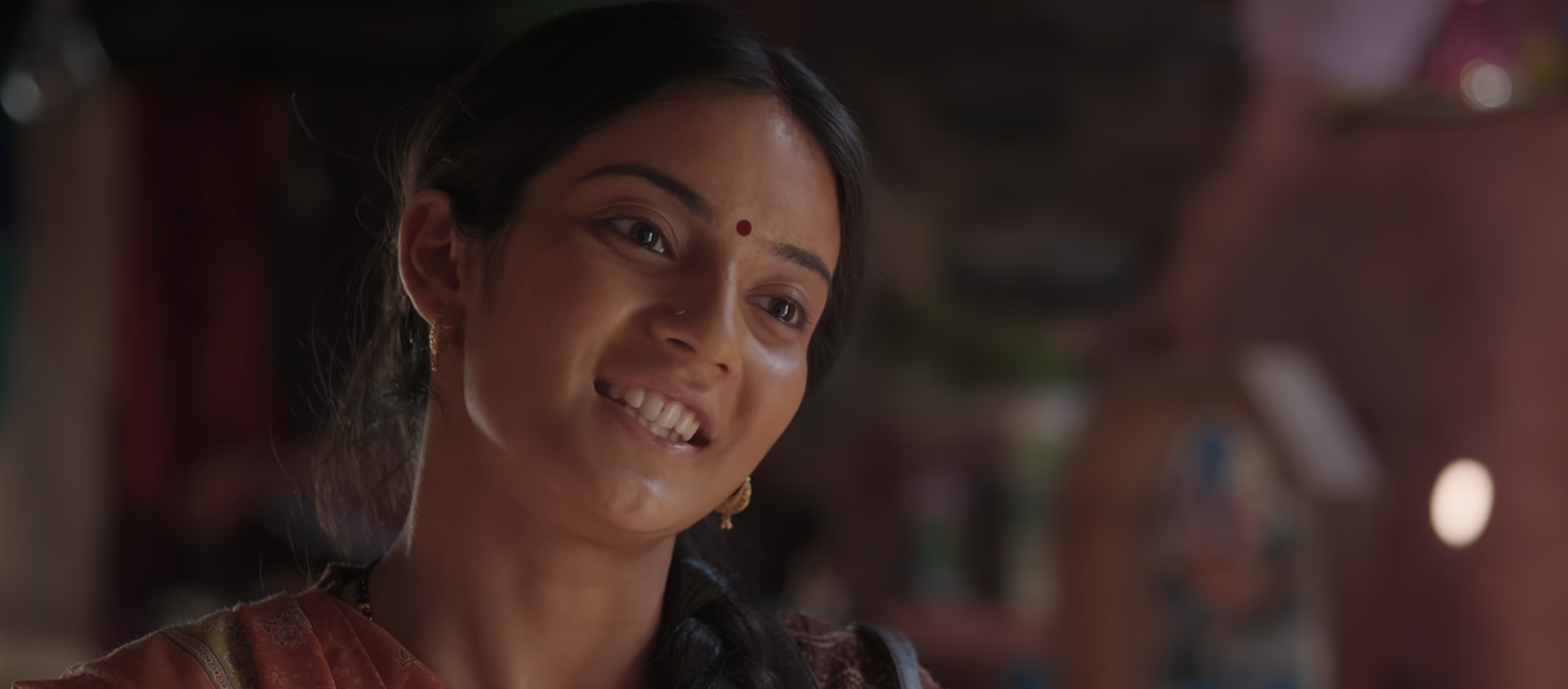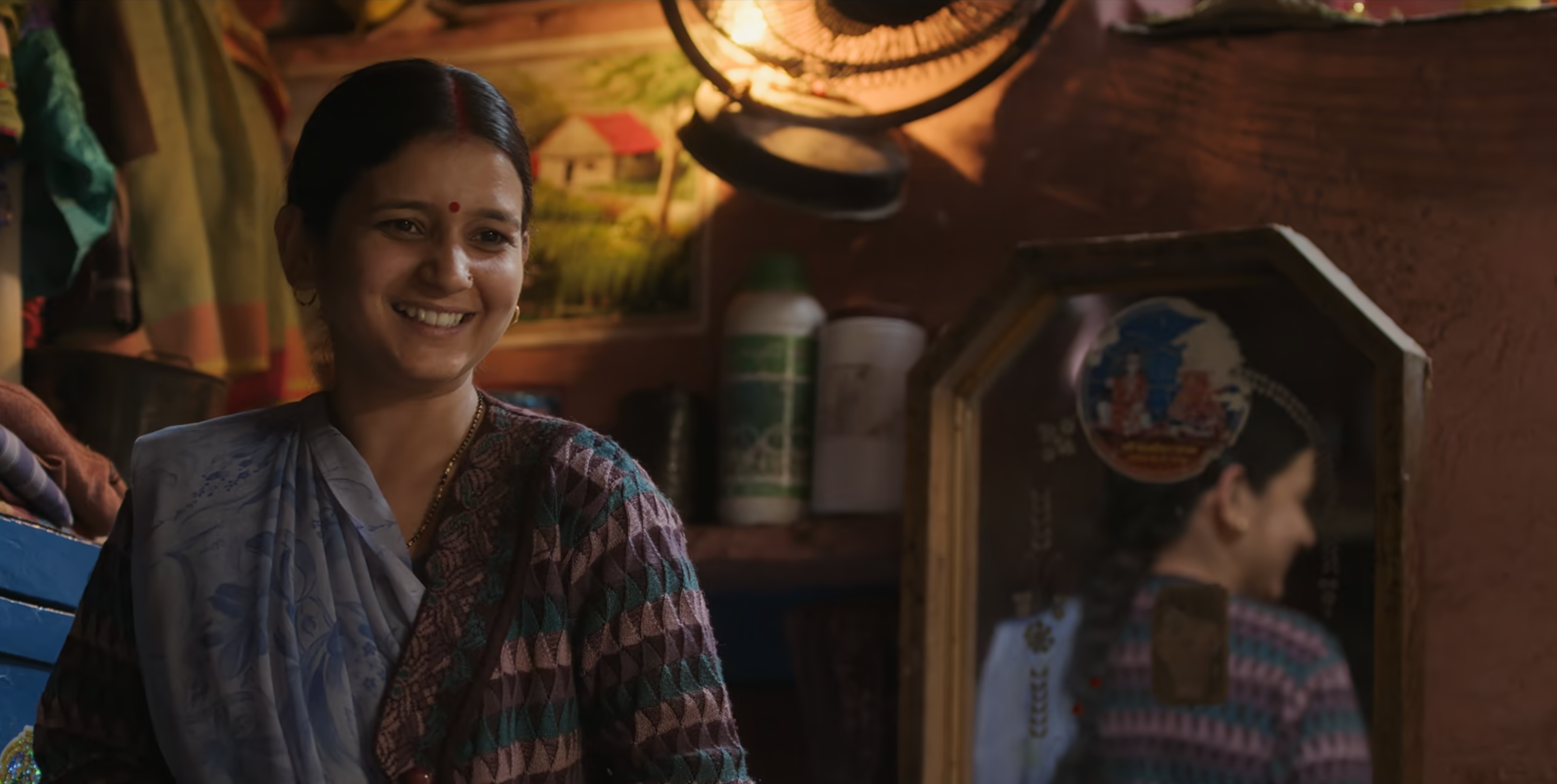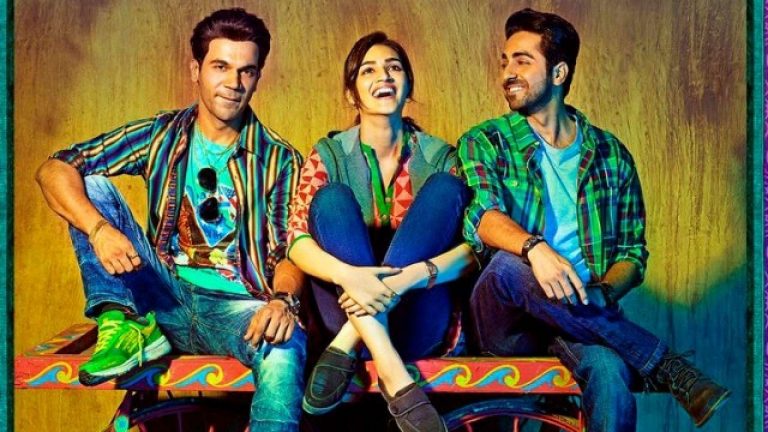One year ago, on an ill-fated Friday in January, I dragged my mother to watch “Pathaan” with me—an offense that my mother has not forgiven me for. Since then, no matter which film I suggested, she’d ask, “Yeh Pathaan ke waise toh nahi hai na?” (This is not like “Pathaan,” right?) She never stopped doubting me! However, seated for Kiran Rao’s “Laapataa Ladies” as we entered the fictional north Indian state of Nirmal Pradesh in the year 2001, we knew that this film was simply different. We watched Phool (Nitanshi Goel) and Deepak (Sparsh Shrivastav) get married.
We watched Phool adorn a ghoonghat as they make their tumultuous journey via various means of transport – the final one being a train to Deepak’s hometown. Funnily enough, their coach has three other Just Married couples. The women look unrecognizably similar, thanks to their similar bridal sarees and similarly long ghoonghats. Watching them, I had a strange feeling that my Dadi would’ve been thrilled to see herself represented on screen like this.
The Masculine Heroine Problem in Kiran Rao’s ‘Laapataa Ladies’
Before “Laapataa Ladies,” watching “Rocky Aur Rani Kii Prem Kahaani” with my mother had done its bit in mending my tarnished trust. The audience’s laughter, enjoyment, tears, and sighs are all part of a core memory now. A memory that constantly reminds me that (Indian) feminism in film has never been about women with machine guns fighting men – that’s a man’s understanding of what feminism is: an erasure of the feminine, a masculine modality confined within the walls of patriarchy. Don’t get me wrong, I loved Deepika in “Pathaan” more than Shah Rukh Khan himself. However, in my mother’s defense, I enjoyed the film but stepped out of the cinema hall and immediately forgot about it.
Fortunately, I cannot say the same about “Laapataa Ladies.” Boisterous laughter emerged in the theatre as we tagged along through a series of comedic errors: Deepak gets off the train with the wrong bride, Phool is stranded at the wrong station with no one right in sight. Back at Deepak’s home, the wrong bride, Pushpa (Pratibha Ratna), has no clue where she is supposed to head either.
Deepak’s family believes her – it is alright that women do not know these things. A stranded Phool doesn’t know the name of the village she’s to be married into and live in either. Nobody thinks it is necessary to let her know the address and the way to her new home. In the wee hours of dawn, Phool meets Chotu (Satendra Soni) at the railway station, and despite the chai-seller’s insistence, she refuses to go to the police station. The same cannot be said for Pushpa- oops, Jaya.
Deepak files a missing report for his missing wife at his local police station, but the corrupt police officer, Shyam Manohar (Ravi Kishan), is more interested in Pushpa’s case and starts tailing her. We learn that Pushpa is not Pushpa but Jaya—she is hiding her true identity, her gold, and a Nokia cell phone. Mr. Manohar has terrible photo-taking skills, but to the soundtrack of ‘Doubtwa, ‘ he manages to uncover Jaya’s truth—his version of it, at least.
Women: The Problem
Doubtwa is a song dedicated to the doubtful ladies, who, according to patriarchy, are the worst, most dangerous kind of women. Right from childhood, we are told not to trust the kinds of women who want a separate home away from their husband’s families, women who remind others that cooking isn’t a duty but joy, women who befriend their sisters-in-law, women who encourage their mothers and mothers-in-law to no longer tolerate their misogynistic husbands—the kind of women who refuse to entrap themselves in ugly marriages. The Manju Maai kind of women. Played by Chhaya Kadam, Manju Maai runs a tea stall at the station and takes Phool under her wing with much reluctance and annoyance.
We can’t blame Manju Maai; Phool’s naivety and helplessness are extremely annoying. But Manju Maai doesn’t let her dwell on it. Phool starts working at the stall and quickly catches up with the business. In Manju Maai, Phool finds her mentor. The first person who shows her, in the simplest manner, that a woman can be more than a wife. She embodies women who have seen through the fraudulent scheme of patriarchy and called bullshit on it, who are rude and unabashed, and who have learned to live in solitude and on their own terms. A life that comes at a lonely cost, as Manju says, “Khud ke saath akele rehna bohat mushkil hota hai, Phool,” but once you’ve mastered that, nobody can hurt you.

Films like “Rocky aur Rani Kii Prem Kahaani” (a deeper and better take on feminism than “Barbie,” dare I say) talk to Indian society as a whole. In classic Dharma fashion, their target audience, as a rule, is everyone. The film shows us the world we must move towards in a funny, humiliatingly relatable, and non-preachy way. It talks to men by putting them in the literal shoes of their female counterparts, blatantly experiencing the horrors of living with the other’s family that does not respect you.
Our culture, life, and family values are so deeply intertwined in misogyny that the more significant problems cannot be solved if the smaller ones are left unaddressed. One such small moment that caught me off-guard and pierced my heart was when Deepak’s mother casually said that in an attempt to make food palatable for her husband, she had simply forgotten her mother’s recipe for her favorite lotus stem saag. In many ways, she has lost and forgotten her mother’s very memory. But watching Phool blossom under Manju Maai, make her first income by monetizing her one skill, cooking, and expressing hurt at being groomed into helplessness, I knew that for the first time in a long time, a Hindi film made me think: “This movie was made for women.”
Wait, Is Man The Problem? (He Is.)
In so many ways, the film talks directly to the women. It’s not asking men to change or burdening women to change men but asking women to take charge of their own lives. Here, I’d like to talk about Deepak’s character: his earnestness, his loyalty, and his love for his wife. Deepak is dear to me, but it’s funny that the world finds commendable what is simply the bare minimum. If marriages come with vows, shouldn’t worrying and caring about your wife be the unsaid rule, the one thing a husband must do?
We see Deepak and Phool converse only thrice in the film. In their first conversation, Deepak asks Phool to remove all her jewelry and leave it in his safety, lest they get robbed on the bus. He tells her that going to a police station is a fate worse than getting robbed. And his words become gospel to her. So, even while stranded at a railway station with nowhere to go, Phool never goes to the police station. It was during my second watch of the film that I realized that if Phool had gone to the police, she would have been found within two days, just like Jaya was.
Ever since they are little, girls are told that their husbands are always right, and they grow up believing it. Is this the price we pay for trusting, in good faith, the things that men tell us? Is this why the world doesn’t like women who question things, who don’t accept ideas at face value and apply their critical thought? At every turn in life, women are denied knowledge of their world – of logistics, of science, of business, of academics, and of life. We are raised to be laapataa in every sense of the word.
Deepak and Phool get on the train from a not-even station; there’s no platform, but the men know where to get on from and where to go. Phool has no clue. The Mobility Problem still persists in the real world. More than 80% of texts between me and my male sibling are him asking me to “send live location” and me sharing it whether I’m in the city or out of it. He must always know of my ‘live’ whereabouts. I’m not complaining; even if it bothers me, I need this safety. It is a dangerous world. But how can we know our world and dream beyond it when we have no idea what it even looks like?
The Knowledge Problem in Kiran Rao’s ‘Laapataa Ladies’

In Phool, we witness the completion of a character’s arc. A lost, pitiful girl comes around to incorporate the most foundational feminist ethics: financial independence, self-respect, and treating yourself as equal to your partner. When Phool goes on a journey (while stuck at the station), we meet Jaya as a well-rounded, complete character. She knows what she wants and isn’t afraid to grab it. In a strange village, she manages to plot her escape.
“Laapataa Ladies” is a sweet film that deals with serious topics in a joyous fashion. Throughout the movie, I could hear men laugh at its situational humor louder than women. However, watching Jaya plead for her freedom teared me up. At the police station, a broken and disappointed Jaya says that women are always looked at with a lens of doubt. It’s almost funny to think that the police thought she was a sinister gang member when, in reality, all her ploys and elaborate plans were a means to achieve the simplest of desires: freedom and education.
I call it desire and not a birthright because, more often than not, the mere opportunity to receive an education is the beginning and end of a girl’s dreams. Access to formal education made Jaya want to learn more, study more, and seek more opportunities that would separate her from the herd. Being knowledgeable further fueled her thirst for knowledge. Maybe that’s why women having 12 or more years of schooling marry much later than those who don’t, for they realize there simply are much better things in life to do.
At her vidaai, Phool is asked to: “Learn to walk with the ghoonghat, keep your eyes to the ground.” When you’re veiled from the world and walk around with blinders, not only are you hidden from the world, but you also never see beyond yours. And when you never see beyond your view, you never learn. When you’re conditioned to remain at the station that someone else chose for you, when you don’t receive the time, investment, and training that allows your intellect to grow and flourish, when you’re told that your world is behind the purdah and your view constricted to the ground then you will never look up and be part of the world that will make cars fly – because your intellect was never given the tools to imagine, the liberties to dream, and the opportunities to soar.
The Solution
So what is the solution? Is it to be like Jaya, who jumps on the one chance at freedom the universe presents to her? Is it to realize there’s no point in remaining loyal to a family who puts their reputation and ‘honor’ over your dreams, forces their ‘love’ over your respect?? Or is it to run away and break families and marriages if that’s what it takes to take charge of your life? Or can it be that parents, families, societies, and worlds just let women have the ‘easy’ route? Can they let us be, as they have men, so we can fight bigger problems that the world faces? I’d like to think so.
The film does present a few tangible solutions for women, though. To form female friendships not bound by family (Jaya and Poonam), to find companionships not bound by marriage (Phool and Chotu), to find a supportive family outside your own (Manju Maai & Co), and to fight your circumstances and seek the world. In Jaya, we see the feminist in progress, one whose foundations are solid, and her resolve takes inclusion in its stride. The simple choice to stay another day and help Deepak find Phool shows us that Jaya was far more empathetic to the world than the world had been to her.
In a true nod to the spirit of feminism, Jaya risks her freedom on the off-chance that, with her help, they’d be able to find Phool. And as a rule, humanity and feminism need to be inclusive: one must include others in their freedoms. If you cannot use your privileged knowledge for the better, and if your liberties do not include the deprived, then you are part of the problem. Jaya chooses to be a part of the solution. This is the moment when the idea becomes bigger than the subject, the collective transcends the self, and the woman becomes the hero.
But if you ask me, what is the film’s biggest win of all? It finally repaired my laapataa reputation and redeemed me in my mother’s eyes.





